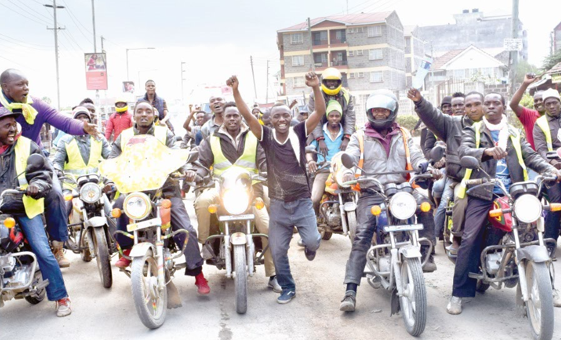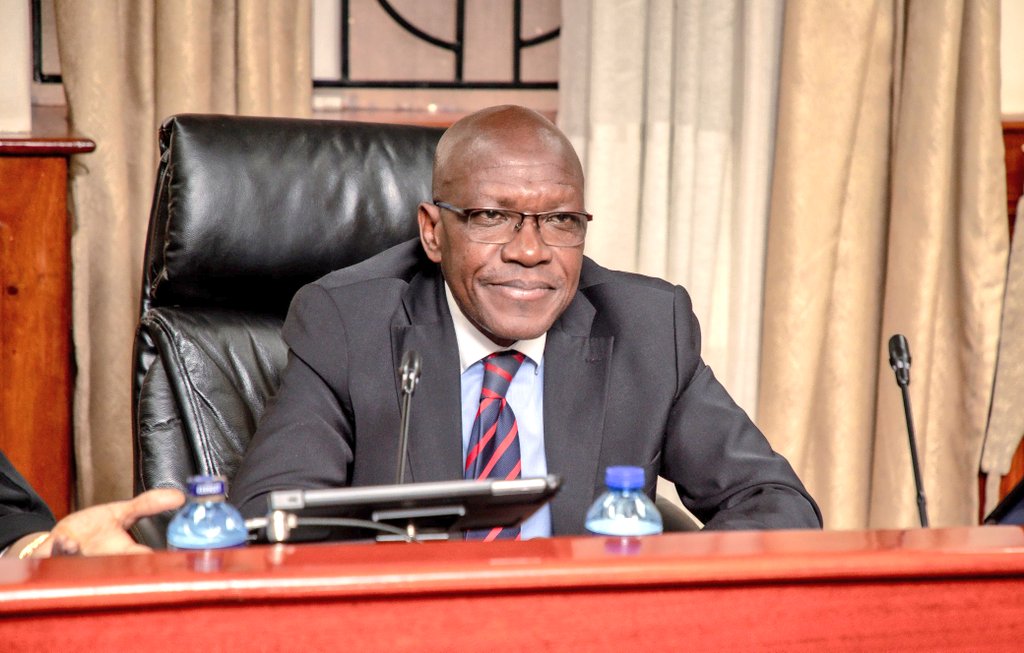How lenders are ripping off naive boda boda riders

It is daylight robbery. What is marketed as easy acquisition of motorbikes on cheap loan for business has turned into a nightmare for beneficiaries who have not only lost the boda bodas but also family property used as collateral.
The rip off is orchestrated in exorbitant interest charges, hidden costs and the most cruel of recovery methods which has left many families in pain, marriages broken and children orphaned.
The more than 1.2 million motorbike operators are quietly suffering at the hands of predatory financial institutions fleecing them through hire purchase systems.
Most of the operators who have fallen prey to the Buy Now, Pay Later (BNPL) dealers want the government to urgently intervene in the matter and take action against institutions they are accusing of ripping them off. Several BNPL startups offering asset financing specifically for boda boda riders, allow them to pay the loans in installment online.
But the operators are now accusing the firms, which mostly operate online, of pushing them into expensive debts in their quest to maximize their profits.
Speaking to the People Daily, some boda boda operators say some of their colleagues have fallen into depression after failing to repay their loans as others lose their bikes, amid a surge in robberies targeting motorcycles.
In one of the said rip-offs, one of the organisations selling motorbikes requires an individual to pay a deposit of Sh12,000 and thereafter, make a daily payment of Sh400 for eighteen months.
Cumulatively, the individual ends up paying Sh211,200 after 18 months. With Mpesa charging Sh27 for every transaction plus the Sh12,000 deposit, the individual ends up coughing out Sh237,456 for a motorbike that retails at between Sh100,000 and Sh130,000 market price.
Repossessed
This is as lenders face concerns over their ability to protect their customers’ data, particularly GPS tracking data that bike theft syndicates can exploit.
For instance, Enock Wambua who operates in Kitengela, Kajiado county showed the People Daily copies of receipts of payments for his motorbike. He has so far paid Sh185,600 and still has a long way to go before he clears the loan.
Ordinarily, his motorcycle model costs between Sh110,000 and Sh130,000 depending on the location of the retailer, but he is required to pay a total of Sh245,000 when he is done with payments through hire purchase.
Darius Akumonyo is a very bitter man owing to his experience with a firm that handed him a boda boda on loan.
Akumonyo, a resident of Ikolomani constituency, Kakamega county has opted to completely abandon the boda boda business after his motorbike was repossessed by the company on what he views as flimsy grounds.
“I paid a deposit of Sh25,000 for a Honda motorbike after which we agreed that I would pay Sh15,000 per month for 21 months. I took good care of the motorbike and religiously paid for 18 months without any failure,” Akumonyo narrated.
“In the 19 month, I lost my mother which destabilized me financially. I, therefore, reported to them that I was bereaved and asked that they defer my payment for that particular month. They pretended to have accepted,” he added.
He says on the 15 day of the 20th month when he was raising money for the deferred month, he received a call from the firm that he goes to their offices in Kakamega town to check on some new bikes which they told him they could exchange for his current one if he so wished.
The rider did not know that it was a trap. “When I arrived at their offices, they took away the keys from me and insisted that I clear the previous month instalment before I could be allowed to go back with it,” he said. He pointed out that he tried to explain that he had requested for a month’s deferment due to bereavement but that they would hear none of it.
“I was forced to go back home on foot to seek Sh15,000 which I did after three days. But when I went back they took the cash I had and ordered me to clear the two remaining installments before they would hand it back to me. I was devastated because I was completely unable to raise Sh30,000, especially now that I was not even in business,” he added.
Akumonyo, 32, said he was forced to venture into artisanal mining to raise the money. He managed to raise the money after a month but to the shock of his life, the company said he had delayed and so they had disposed of the bike to cater for the installments and other costs.
“They were not even shameless and offered me another motorbike. I walked out of the premises and that was the end of my boda boda business,” he said tearfully.
He said he has been trying to seek justice from the police but that there seems to be corruption as no action has ever been taken against the company.
The father of two, has, meanwhile, elected to continue with his artisanal mining to make ends meet hoping that he will be served justice some day.
Jackson Keengu, a boda boda operator who lost his bike to robbers in March last year, just a day after he completed repaying his loan to a lender company is a sad man. “I carried two pillion passengers from Kisii town to Kisii School. I found myself at the hospital the following day without a bike after being drugged,” Keengu told People Daily.
A father of three who operates at Rubis Stage in Kisii town, he said the thugs dashed his hope of self-employment and reliance. “After paying a deposit of Sh20,000, I paid Sh3,100 weekly, for 14 months, which I cleared after remitting a total of Sh180,000,” Keengu noted.
He said whenever he fell sick or was away from work, the company advised him to let a “ squad member” drive the bike for the business to continue.
The operator says life is even harder for those employed as boda bodas but have to pay the employer daily whether they have made money or not.“ If you are sick, the employer will take his bike and engage another operator,” Keengu noted, sentiments shared by colleague Wyclife Ombati.
Paying double
Samuel Nyandemo, an Economics lecturer at the University of Nairobi says the companies are taking advantage of the high level of unemployment in the country to saddle the youths in debt.
“It is not a fair deal. They should know that they are paying double for the commodity and must be informed to form Saccos to get these products using collateral,” he said.
The riders also raised concern over the quality of emerging motorbikes saying some risk their lives as they break down frequently while still new. They singled out electric motorbikes which they say have turned into a nightmare for them.
For most boda boda operators however, it is the random cases of theft and deaths associated with the motorbikes that has led to an outcry among most operators in the country.
Concerns abound that despite BNPL firms installing trackers on the motorbikes to trace defaulters, they always fail to help their clients after the thefts, and only inform them that the facilities had been disabled.
Boda boda riders are now urging authorities to take decisive action against motorbike credit companies due to a surge in motorcycle thefts linked to loans.
A senate committee has already raised questions about the activities of Watu Credit Limited and wants it investigated over complaints of exploitation and suspicious loss of motorbikes that it sold to boda boda boda operators.
One lawmaker from the Upper House had raised questions on why the company was quick to resell repossessed motorbikes from customers who default on payments. Kajiado Senator Seki Lenku had also raised concern over exorbitant rates charged by the lender.
“This interest thing is where there is exploitation. This means if a motorbike is retailing at Sh150,000, then they will pay more than Sh300,000 at the end of the hire purchase term,” he said.
But the company’s chief executive Andris Kaneps defended itself saying the firm sold over 70 per cent of motorbikes, creating the impression that they are being fought by competitors.
Motocycle theft is a rampant problem countrywide but a few cases are taken out of context. Most of the motorbikes stolen are less than six months old. Thieves don’t like old motorcycles,” Kaneps told a Senate committee last year.
On repossession, Erick Massawe, the Watu Credit Country director refuted claims that they always repossess those motorbikes and dispose of them immediately saying that they usually engage the clients who have defaulted for three months before they repossess their bikes.
Disturbingly, instances have been reported where riders who resist the thefts are subjected to brutal violence.
They question the coincidence that every stolen bike disappears just a month before the completion of payment. Complaints made to creditors are met with indifference, and excuses such as tracker disconnection are frequently cited.
John Wanyama, a rider in Kitengela, expresses frustration: “When we report the cases to the creditors, they are less concerned, and they always have excuses that the tracker has been disconnected.”
The riders point out the irony that, even when they fail to pay and disconnect the trackers, credit companies relentlessly use all available means to trace them.
Earnest Mutisya, another rider, reveals the scepticism among riders regarding the credibility of tracking systems. He suggests that some creditors may be involved in the thefts, raising concerns about potential collusion with rogue police officers who refuse to document cases of stolen loaned motorbikes.
Geoffrey Karanja, the chairperson of the Kitengela boda boda association overseeing over 7,000 motorcycle operators, underscores the severity of the crisis.
He disclosed that within the last year alone, at least 52 motorbikes acquire on loan have been stolen in Kitengela.
Karanja calls for intervention from stakeholders to safeguard the sector, citing the risk to both livelihoods and lives posed by criminal activities masquerading as legitimate business dealings.
Reporting by Christine Musa, Milliam Murigi, Robert Ochoro and Denis Lumiti









